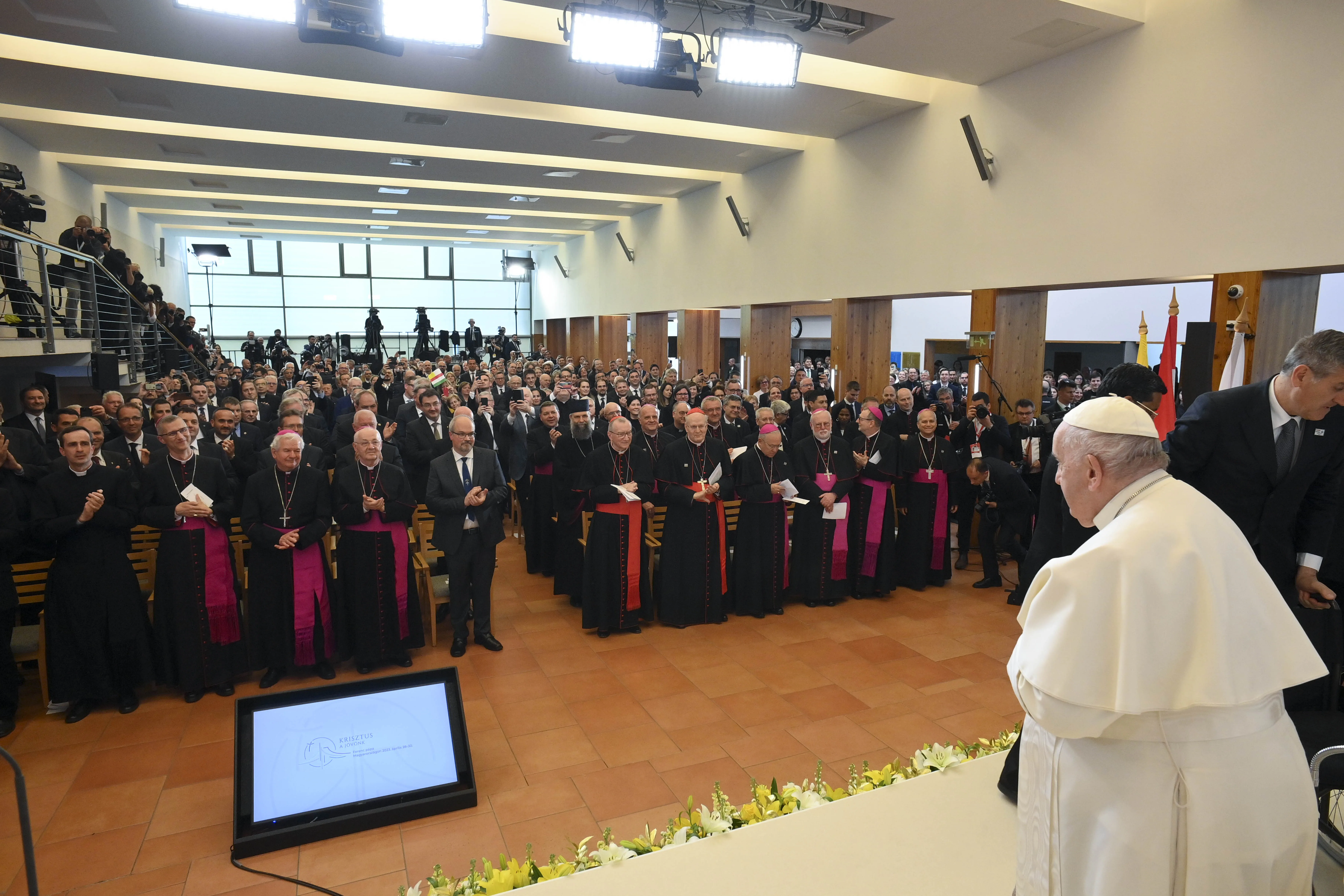![]() By Hannah Brockhaus for CNA
By Hannah Brockhaus for CNA
Rome, Italy, Apr 30, 2023 / 09:30 am (CNA).
Speaking at a Catholic university in Hungary on Sunday, Pope Francis warned of the risk of technological domination and the threat it poses to culture and to our human ecology.
He also spoke about the false freedoms offered by both communism and consumerism, and encouraged people to seek out Christ’s truth.
On April 30 the pope addressed around 250 people, including 30 students, from the Faculty of Information Technology and Bionics at the Pázmány Péter Catholic University in Budapest.
The visit marked the final meeting in Francis’ three-day trip to Hungary’s capital.
In his speech, Pope Francis made extensive reference to the 20th-century intellectual, Romano Guardini, a Catholic priest, theologian, and philosopher, and the author of the book, “Letters from Lake Como: Explorations in Technology and the Human Race.”
“Guardini did not demonize technology, which improves life and communication and brings many advantages, but he warned of the risk that it might end up controlling, if not dominating, our lives,” Pope Francis said.
The priest, he added, “foresaw a great threat: ‘[in that case] we lose all the inner contact that we might have derived from a sense of proportion and the following of natural forms. We become inwardly devoid of form, proportion and direction. We arbitrarily fix our goals and force the mastered powers of nature to bring them to fulfillment.’”
Francis said Guardini “left posterity with a troubling question, ‘What will become of life if it is delivered up to the power of this dominion?’”
“A system of machines is engulfing life… Can life retain its living character in this system?” Guardini asked in one of the letters in his book. “Can life retain its ‘living’ character?” the pope repeated. “This is a question that is proper to ask, particularly in this place, which is a center of research into information technology and the bionic sciences.”

Pázmány Péter Catholic University is a private Catholic university founded in the 17th century. It is one of Hungary’s oldest educational institutions.
The Faculty of Information Technology and Bionics “is unique in Hungarian higher education” for training IT engineers in the human sciences, especially genetics, the nervous system, and the immune system, according to the university’s website.
At the university, Pope Francis also warned of the “false notion of freedom” offered by the ideologies of communism and consumerism.
He quoted Jesus’ words that “the truth will make you free” and said “communism offered a ‘freedom’ that was restricted, limited from without, determined by someone else.”
“Consumerism,” instead, he added, “promises a hedonistic, conformist, libertine ‘freedom’ that enslaves people to consumption and to material objects.”
The way forward, Pope Francis said, is truth: “The key to accessing this truth is a form of knowledge that is never detached from love, a knowledge that is relational, humble and open, concrete and communal, courageous and constructive. That is what universities are called to cultivate and faith is called to nurture.”
Francis also pointed out the increasing isolation of people immersed in social media, while being less and less “social,” and who “often resort, as if in a vicious circle, to the consolations of technology to fill their interior emptiness.”
“Living at a frenzied pace, prey to a ruthless capitalism, they become painfully conscious of their vulnerability in a society where outward speed goes hand in hand with inward fragility,” he said.
The pope added that he did not want to encourage pessimism, but to reflect on the “hubris of pride and power denounced at the dawn of European culture by the poet Homer, which the technocratic paradigm exacerbates, and threatens, through a certain use of algorithms, to further destabilize our human ecology.”
The pope in his speech also addressed the importance of culture, which he described as “the ‘cultivation’ of our humanity and its foundational relationships: with the transcendent, with society, with history and with creation.”
He said the 1907 novel “The Lord of the World,” by Robert Hugh Benson, “was to some degree prophetic in its description of a future dominated by technology, where everything is made bland and uniform in the name of progress, and a new ‘humanitarianism’ is proclaimed, canceling diversity, suppressing the distinctiveness of peoples and abolishing religion.”
“Opposed ideologies merge and an ideological colonization prevails, as humanity, in a world run by machines, is gradually diminished and social bonds are weakened,” he said.
“In the technically advanced yet grim world described by Benson, with its increasingly listless and passive populace, it appears obvious that the sick should be ignored, euthanasia practiced and languages and cultures abolished, in order to achieve a universal peace that is nothing else than an oppression based on the imposition of a consensus.”
The pope said one of the messages he wanted to leave the university students and faculty with was the famous maxim “know thyself.”
“What do those words mean: Know thyself? They counsel us to be able to recognize our limitations and, consequently, to curb the presumption of self-sufficiency,” he said. “Technocratic thinking pursues a progress that admits no limits, yet flesh and blood human beings are fragile, and it is precisely by experiencing this, that they come to realize their dependence on God and their connectedness to others and to creation.”
Pope Francis’ visit to Budapest included meetings with President Katalin Novák and Prime Minister Viktor Orbán. He also spent time with visually impaired children, young adults, and clergy. On the morning of April 30, he celebrated Mass for 50,000 people gathered in and around Kossuth Lajos Square.
If you value the news and views Catholic World Report provides, please consider donating to support our efforts. Your contribution will help us continue to make CWR available to all readers worldwide for free, without a subscription. Thank you for your generosity!
Click here for more information on donating to CWR. Click here to sign up for our newsletter.
The Good Shepherd calls us to ‘open our hearts to love,’ Pope Francis says at Mass in Hungary
Pope Francis says he did not lose consciousness before hospitalization in March
Pittsburgh, Pa., Feb 15, 2021 / 04:47 pm (CNA).- Four Catholic elementary schools will merge to form two schools for the school year beginning in fall 2021, the Diocese of Pittsburgh has said, as the local bishop stressed their continued importance.
“Catholic schools are vital to the future of both our Church and our world,” Bishop David Zubik of Pittsburgh said Feb. 12. “They educate minds, hearts, and spirits, teaching the value of service as they prepare young people to become productive citizens and future leaders.”
“Each day I thank God for all who faithfully support our Catholic schools,” said Zubik. “They serve our students, our diocese, and Jesus himself.”
Saint Elizabeth of Hungary school in Pleasant Hills will merge with Saint Gabriel of the Sorrowful Virgin in Whitehall. The Saint Gabriel campus will serve as the main site of the merged school.
Saint Phillip school in Crafton will merge with Saint Margaret of Scotland school in Green Tree, whose campus will serve the merged school.
Father David Poecking, president of South Regional Catholic Elementary Schools, said the decision follows “more than a year’s deliberation and many, many hours of study.”
“While change can be difficult, we can bring together the best of the past to support a strong future for the newly merged schools,” Poecking said.
The mergers were recommended after study of financial and demographic data, enrollment trends, and consultation with the parish and school communities.
Zubik approved the merger on the recommendations of the South Regional Catholic Elementary Schools, which became the new regional governing board in July 2020. It had previously served as an advisory board since its creation in 2017.
The Pittsburgh diocese credited the board with stabilizing enrollment and finances. It sees progress in regional organization of some schools.
“With regional governance, all of the parishes in a geographic region support Catholic school education and all have a voice in forwarding the mission of those schools,” the diocese said.
Michelle Peduto, Director of Catholic Schools, said the diocese’s school system will continue to work “to provide families with spiritually vibrant, academically excellent and financially sustainable Catholic schools for generations to come.”
The diocese is continuing a strategic planning initiative begun in 2015 in part as a response to declining Mass attendance, the financial struggles of some parishes, and fewer priests.
The diocese’s “On Mission for The Church Alive” initiative has been working to merge what were 188 parishes into what ultimately will be fewer than 60 parish groupings.
In November 2020, the diocese announced that it would begin a third round of parish mergers. This stage of the parish merging plan aims to reduce 107 parishes to 81.
The diocese faced controversy after the 2018 Pennsylvania grand jury report, which detailed sexual abuse allegations in six of Pennsylvania’s eight Latin-rite dioceses, including Pittsburgh. In 2020 CBS Pittsburgh reported that since the report’s release, Mass attendance had dropped 9% and offertory donations declined 11%.
Several hundred sexual abuse claims have also posed significant financial difficulties for the diocese.
Even in 2018, regular Sunday Mass attendees numbered only 120,000, a 30% decline from 10 years before. There are about 628,000 Catholics in the diocese’s territory, according to the diocese’s website.
[…]
Protests in Granada, Nicaragua, April 29, 2018. / Riderfoot/Shutterstock.
Managua, Nicaragua, Oct 25, 2021 / 11:11 am (CNA).
The Nicaraguan bishops’ conference called Thursday on citizens to act freely and to vote according to their conscience a… […]
null / ivanko80/Shutterstock
Washington D.C., Apr 19, 2023 / 15:10 pm (CNA).
Supreme Court Justice Samuel Alito issued a ruling Wednesday extending the court’s temporary pause on all restrictions on the abortion pill mifepristone.The extended p… […]
Francis raises some highly significant dangers to humanness citing Guardini, “A system of machines is engulfing life. Can life retain its living character in this system?”. So relevant now with AI and the intellectual adrenal rush experienced with harnessing immense power and the unexplored.
Man prospectively dominated by technology rendered “bland”. Drones come to mind Queen Bee technology the master. Communism seems to fit into such a scenario, the egalitarian culture morally vacant alive for moments of sensual satisfaction [when the mind finds fulfillment in technical advance it’s considered sensual]. Wherewith the spiritual remains the exclusive remedial.
Your email address will not be published.
All comments posted at Catholic World Report are moderated. While vigorous debate is welcome and encouraged, please note that in the interest of maintaining a civilized and helpful level of discussion, comments containing obscene language or personal attacks—or those that are deemed by the editors to be needlessly combative or inflammatory—will not be published. Thank you.
*
*
Bad ideas continue to have bad consequences
Pope Francis says he did not lose consciousness before hospitalization in March
Alex Murdaugh, katharsis, and authentic freedom
TEXT: ‘Don’t be couch potatoes!’ Pope Francis urges youth
… event, which will be taking place this Saturday, January 21st. The California Catholic Daily reports: San Francisco’s 8th Annual Walk for Life West Coast on Jan. 21 should be the largest yet. It has […]
© Catholic World Report
Sign up to receive a weekly email with news, analysis, and commentary from a voice you can trust!
